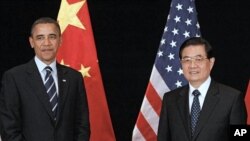A Chinese official says the country is working with the United States to ensure the success of President Hu Jintao’s visit to Washington next week.
In Washington and Beijing, U.S. and Chinese officials say their relationship is one of the most important in the world.
Chinese Foreign Ministry spokesman Hong Lei re-emphasized the point Thursday in Beijing.
Hong says President Hu Jintao’s visit to the United States next week is a major event in bilateral relations. He says China will work with the U.S. side to ensure the trip is a "complete success"”
President Hu last visited the United States in 2006, a trip that was marred by glitches, including a shouting protester from the Falun Gong spiritual movement at the White House.
Economic issues will be near the top of the agenda on this trip. The Chinese spokesman rejected U.S. Treasury Secretary Timothy Geithner’s comments Wednesday that China is moving too slowly in letting its currency rise in value.
Hong says an appreciation of the Chinese currency will not settle the issue of the huge trade imbalance between the two countries.
Many U.S. critics say the Chinese currency is undervalued by as much as 40 percent, giving China an unfair trade advantage.
On Thursday, China set the mid-point of the trading band for the Yuan at a record high 6.5997 to the dollar.
The Chinese spokesman’s comments come one day after Defense Secretary Robert Gates wrapped up a visit to China aimed at mending damaged ties between the U.S. and Chinese militaries.
Gates called his trip productive. Wang Dong, an associate professor of international studies at Peking University, agrees.
"There have been a lot of tensions, a lot of frictions, between the two countries. But now I think it comes the time that top leaders from both China and the United States want to put things back on track, so to speak, and in that regard, I think that Secretary Gates’ visit to China is especially important in terms of bringing the military to military relationship back to track," Wang said.
China last year pulled out of military talks and withdrew an earlier invitation to Gates to protest a U.S. arms sale to Taiwan, a separately governed island that Beijing considers its territory.
In a step that might ease another irritant between the two countries, the Foreign Ministry spokesman said it would be difficult for China’s ambassador to the International Atomic Energy Agency to tour Iran’s nuclear facilities. Tehran had invited Russia and China’s IAEA delegates to inspect its nuclear facilities, but excluded the U.S., Britain, France and Germany.
China has opposed efforts by the U.S. and its European allies to impose sanctions on Iran because of its nuclear activities. Washington thinks Tehran is trying to build nuclear weapons, which Iran denies.
President Hu is to meet President Obama at the White House next Wednesday, for the first state visit by a Chinese leader to the United States since 1997.
China Looks Forward to President Hu’s US Visit




